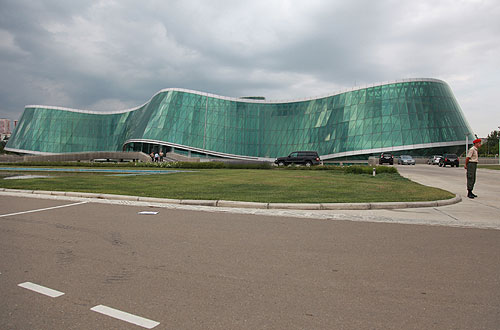
The Interior Ministry’s glass facade building in Tbilisi outskirts. Interior Minister Vano Merabishvili denied on July 13 that the entire case was classified as secret.
A group of eleven watchdog and media organizations, Coalition for Media Advocacy, has called on the law enforcement agencies to clarify explicitly in a written form whether the entire case of arrested photographers is classified as secret or only parts of it.
After the arrest of photojournalists, charged with espionage in favor of Russia, their lawyers said that they had signed a legally binding document obliging them not to disclose information related to the case on the grounds that the entire case was marked as secret. They said that court hearing on pre-trial measure for the arrested photographers on July 9 was also held behind the closed doors on the same grounds.
But at a meeting with a group of media activists and journalists on July 13 Interior Minister Vano Merabishvili said that only some parts, containing state secret, and not the entire case was classified as secret. The same was reiterated by a senior Interior Ministry official in televised remarks two days later.
In a letter sent to Interior Minister Vano Merabishvili; Chief Prosecutor Murtaz Zodelava and Secretary of National Security Council Giga Bokeria, the Coalition for Media Advocacy has requested an official, written response to a question whether the entire case or only parts of it is classified. The coalition has also requested for the information, involving level of classification; an identity of an official who has authorized classification, as well as duration of the classification.
The media group also writes in the letter, that if remarks of senior Interior Ministry officials that only parts of the case are classified are true, the lawyers of accused photographers should no longer be under legal obligation to keep silence on parts of the case, which do not contain state secrets.
There has been no major new development into the arrested photographers’ case since July 18, when the Chief Prosecutor’s Office released extracts from videotaped confession statement of Giorgi Abdaladze, one of the accused, who claims in his testimony that he was recruited by the Russian intelligence in 2002, when he was arrested by the South Ossetian militias while being on an assignment from the Kviris Palitra weekly to take photos at the Ergneti market on the administrative border.
Abdaladze’s lawyers say they doubt about sincerity of their client’s confession. Eka Beselia, one of the lawyers of Abdaladze, said there were “many factual inaccuracies and inconsistencies” in Abdaladze’s confession statement making its credibility questionable. One of such “factual inaccuracy” is related to Abdaladze’s claim that he was held in detention in Tskhinvali in 2002; a newspaper, which gave Abdaladze assignment to take photos at the administrative border, said it was in 2000 and not in 2002.
The authorities have pledged that the all the materials into the case, which do not contain state secrets, would be made open for public scrutiny when the trial starts. The trial stage involving main court hearings of the case in substance, however, may not occur if the prosecution and the accused photographers agree on plea bargain.
